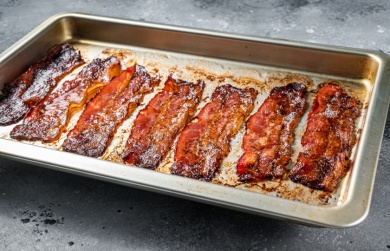New to turkey bacon? Discover Is it already cooked
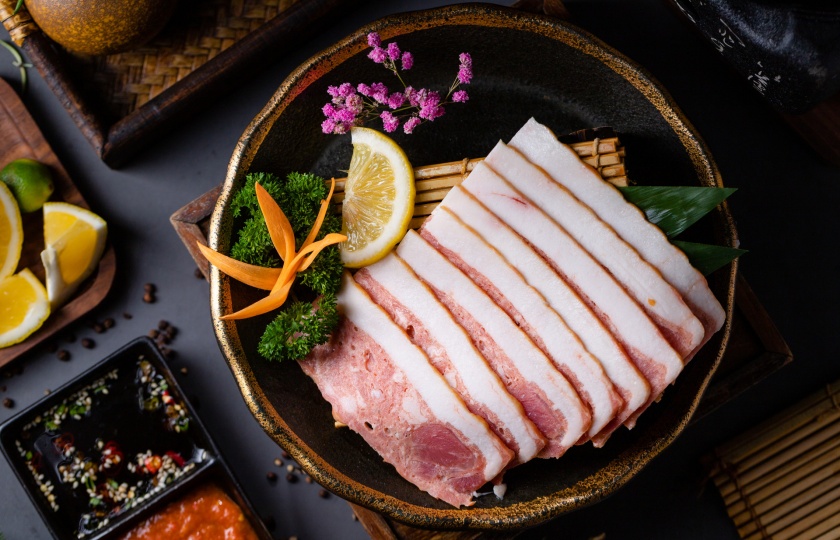
When making turkey bacon for the first time, you may be tempted to wonder if turkey bacon is already cooked. Today, I'll teach you how to tell!
How to Tell if Turkey Bacon is Cooked:
Testing the Temperature
This is the most accurate and scientific method, and it's also very easy to do. Just insert a food thermometer into the thickest part of the turkey bacon, being careful to avoid the bones. If the temperature reaches 74°C or higher, it means the turkey bacon is cooked.
Observing the Color
Generally speaking, raw turkey bacon has a relatively dark color, appearing dark red or dark brown. Cooked turkey bacon will have a uniform golden or dark brown color on the surface.
Checking the Texture
Cooked turkey bacon becomes soft and elastic. You'll feel an obvious resistance when picking it up with chopsticks or tongs. If it's soft and sticky, it means it's not cooked.
Tasting
If you think the turkey bacon is cooked but aren't sure, you can cut off a small piece and taste it. If the turkey bacon tastes delicious and has no fishy smell, it means it's cooked.
Reference for Cooking Time
Under normal circumstances, a whole piece of turkey bacon takes about 15 - 20 minutes to cook in boiling water. If it's cut into small pieces, the time can be appropriately reduced to 10 - 15 minutes.
Can you eat turkey bacon without cooking it?
It's not recommended.
Like regular bacon, turkey bacon is processed meat. It has been processed and cooked before leaving the factory. Technically, it can be eaten directly.
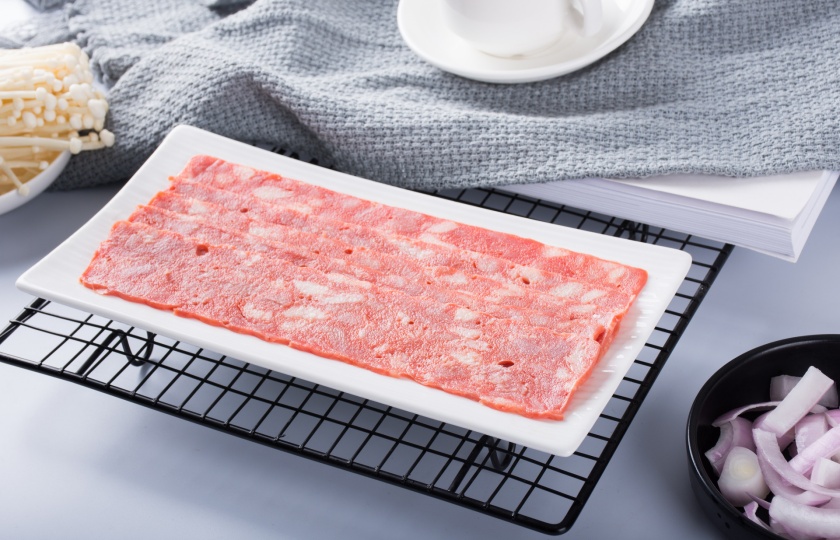
However, from the perspective of food safety, eating raw turkey bacon poses certain risks because the processing before leaving the factory may not completely eliminate potential bacteria. That is to say, uncooked turkey bacon may contain parasites or pathogens such as Listeria and Salmonella, which can only be effectively killed at high temperatures.
Secondly, turkey bacon is processed meat and contains additives such as nitrites. These ingredients are reduced during high-temperature cooking, thus reducing potential health risks.
Therefore, for food safety, it is recommended to conduct simple heat treatment before eating. For example, fry, roast, or heat it in the microwave to ensure food safety and enhance the aroma and taste of the bacon.
How long does cooked turkey bacon last in the fridge?
The storage time of cooked turkey bacon varies depending on the storage location in the refrigerator.
Refrigerator Refrigeration
Seal the cooked turkey bacon and put it in the refrigerator's refrigerating compartment. Keep the temperature at around 2°C - 8°C. It can be stored for 3 - 5 days. During this period, it won't affect the taste of the turkey bacon. Just reheat it when you eat it.
Refrigerator Freezing
If you want to extend the storage time of the turkey bacon, you can put the sealed turkey bacon in the freezer using a sealed bag. Keep the temperature below -18°C. It can be stored for 3 - 6 months.
However, it should be noted that the taste of frozen turkey bacon may change slightly. It won't be as tender as when it was first cooked.
How to store turkey bacon after opening?
Here's how to store turkey bacon after opening:
Refrigerator Storage
If you can't finish the opened turkey bacon in time, seal it with a sealed bag, vacuum packaging, or plastic wrap and put it in the refrigerator's refrigerating compartment. It can be stored for 3 - 5 days.
Be careful not to let it come into direct contact with other foods to avoid cross-contamination.
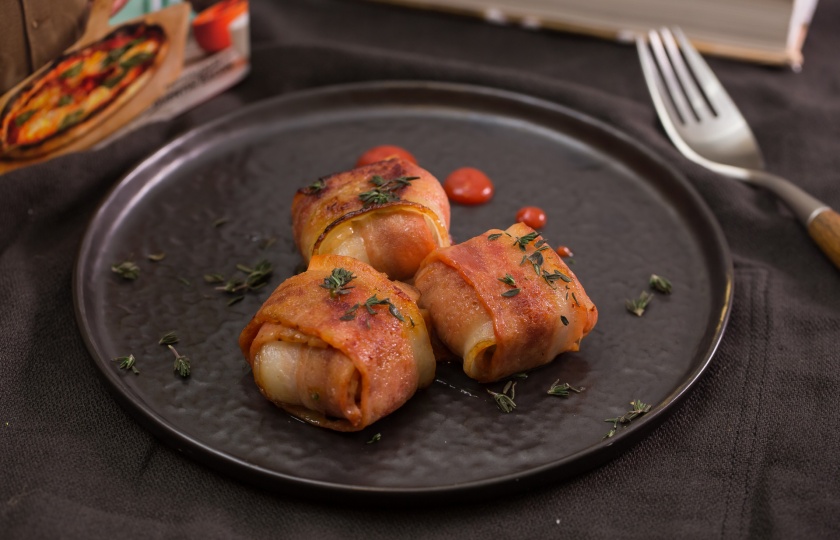
Freezer Storage
If you need to store it for a long time, divide the turkey bacon into appropriate small portions, seal them with plastic wrap or a vacuum bag, and put them in the refrigerator's freezer. It can be stored for 3 - 6 months.
Spray a layer of water on the surface before freezing to prevent ice crystals from forming and maintain the taste.
Other Storage Tips
Vacuum Packaging: It's best to use a vacuum packing machine to vacuum-pack the turkey bacon, which can greatly extend the storage time and maintain its original flavor.
Plastic Wrap Wrapping: Spread the turkey bacon flat on plastic wrap and wrap it tightly to ensure no air enters.
Is uncured turkey bacon processed?
Uncured turkey bacon is also processed.
From the perspective of raw material processing, turkey meat goes through selection, cutting and other processes. The process is relatively complex. Details are as follows:
Raw Material Processing: Turkey meat goes through trimming, skinning, etc. to ensure the uniformity and cleanliness of the meat.
Injection and Tumbling: During the processing, some flavoring liquids (such as brine, spices, etc.) may be injected, and the flavoring liquids are evenly distributed by tumbling.
Smoking or Heat Treatment: Even if it's not cured, turkey bacon may go through smoking or heat treatment to give it a unique flavor and extend its shelf life.
Slicing and Packaging: It is sliced into thin pieces and packaged for consumers' convenience.
Is simple truth uncured hardwood smoked turkey bacon gluten free?
No, simple truth uncured hardwood smoked turkey bacon does not contain gluten.
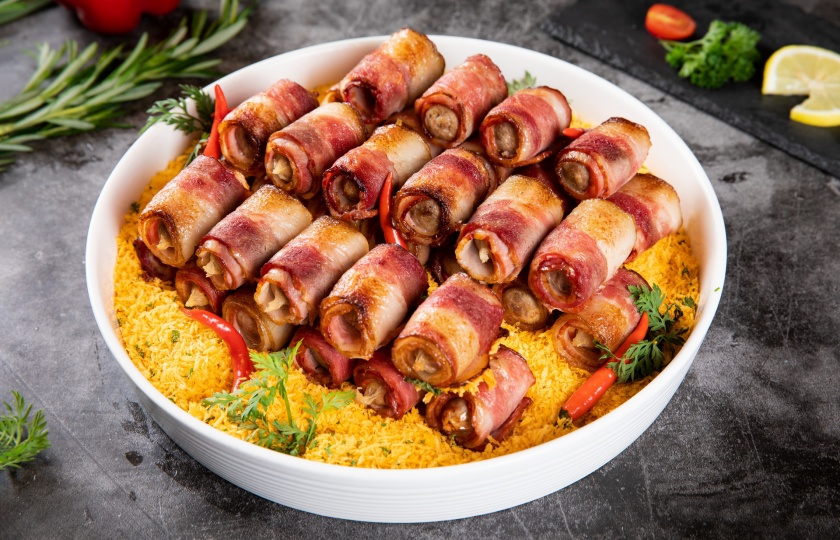
Gluten is a protein complex found in grains such as wheat, barley, and rye. The main raw material of turkey bacon is turkey meat, which does not contain gluten.
During the hardwood smoking process, the turkey meat is smoked with the smoke generated by burning wood to add flavor and preserve it. No gluten components are introduced during this process.
Therefore, under normal circumstances, uncured hardwood smoked turkey bacon does not contain gluten.
However, it should be noted that even if the product itself does not contain gluten, there may be a risk of cross-contamination during the processing due to shared equipment or facilities. Therefore, if you want to buy gluten-free products, you can pay attention to the following points:
Read the product label carefully: Even if the product is labeled "gluten-free," carefully check the ingredient list to ensure there are no hidden sources of gluten.
Choose reliable brands: Buy turkey bacon from reliable brands and suppliers to ensure quality and safety.
Pay attention to the cooking environment: During cooking, avoid using kitchen utensils or seasonings containing gluten to prevent cross-contamination.













